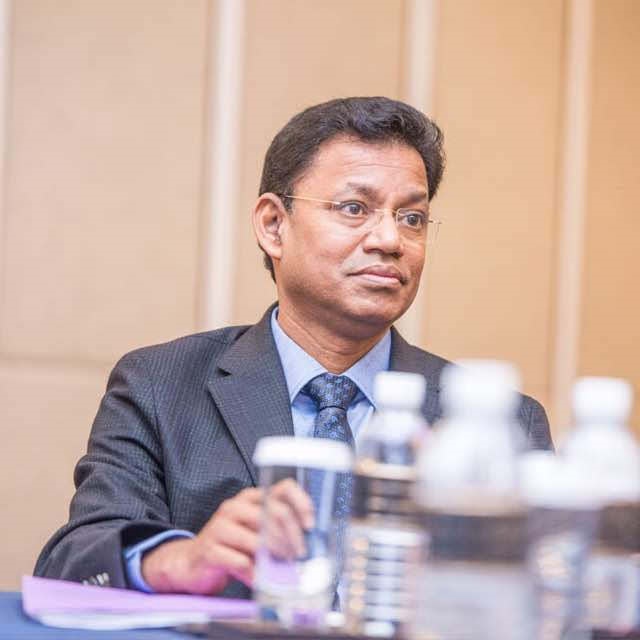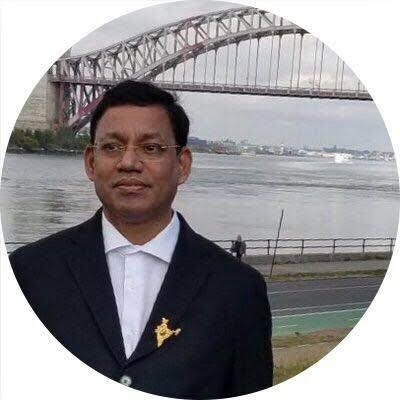Jurist VENKATARAMANA PAMARTY – Man and Persona

India’s freedom struggle has seen several lawyers contribute and only a few have been given glorious recognition by historians. Our young nation even after seven decades has been undergoing great turmoil owing largely to display of political opportunism and voter- appeasement policies by consecutive political dispensations.
On this 77th anniversary of India’s independence from foreign yolk,Corporate Impact recognises the burning need for present crop of lawyers to take up the cause of Justice and ensure that the ideals on which the Constitution of India has been endowed to successive generations are achieved both in letter and in spirit. So,we endeavoured to search out one Lawyer who has played role of freedom fighter in post independent era and this age: one who has been striving for the system to serve justice by liberating motherland from shackles of greedy foreign interest holders.

Pamarty Venkataramana or PVR as popularly known in circles is a multi-disciplinary professional who is credited with steadfastly leading a battery of lawyers, officials and hundreds of diverged political mindsets to ensure that the fabled,priceless collection of so called Nizam jewellery is purchased by the Government of India,and declared as a ‘national wealth’. Creditable achievements include declaring of a certain foreigner as a persona non grata through elaborate court proceedings for espionage activities while ostensibly being a charity patron in our country. The Main Battle Tank Arjun prototype scam unearthed and strictures being passed against then Defence Adviser to then head of Central Government for serving compulsory retirement orders on topmost honest Army Officers was a landmark without fanfare. He had argued in the Andhra Pradesh High Court with malarial fever, temperature running high, literally.
An ex CoAS was hauled up by his notice and pre summoning arguments before a criminal court magistrate for having cast a slur on a deceased Prime Minister under whom he had served in the much publicised Bofors scandal.
Besides this sterling contribution to public service in the interest of all India, PVR has been instrumental in galvanising the Indian diaspora across the globe to come and participate in many a business endeavour of the motherland, especially in health care and biotechnology sectors. He has been pioneering research funding for detection of effective cures through alternative medicine systems to help cure cancer and other terminal diseases . In recognition of which he recently received Kennedy Memorial Award for Lifetime achieving fields of Medicine and Law at Kaula Lumpur. An eminent columnist,author,poet of his own right,this jurist and policy maker is a life member of Supreme Court of India Bar Association.
His training as a Company Secretary,Chartered Accountant,Cost and Works Accountant and Arbitrator has held him in good stead and his doctoral thesis on ‘Corporate and Criminal Jurisprudence’ is a work of intellectual art. He has been Amicus Curae of Supreme Court of India in matters of missed encounter killings against gangsters in prison.

Here’s the excerpt of the Interview taken by Corporate Impact where we delve into several facets of Law and Judiciary which has caught the attention of all India and requires urgent attention. Pamarty Venkataramana speaks very candidly about the power struggle between the institutions of legislature,executive and judiciary. He has brilliant out of box solutions to the cacophonous atmosphere being generated in India today.
What would be your advise to new entrants to the profession Sir?
Should they opt for corporate jobs or practice as a career path? There is a clamour for IPR and arbitration fields nowadays.
Law is a most wonderful profession if one has the bent of mind to take up challenges on an almost daily-basis. Application of knowledge gained does not depend upon qualification or marks obtained at a Law College. This requires abilities to cope up with stress and setbacks as also the capacity to stomach travesty of justice often times. Looking at the multiplicity of both laws and cases, the country needs more and more practitioners. As such, those who do not have other domestic compulsions,ought to step into active practice. Corporate career may offer financial security and the glamour that comes with as a paraphernalia. However it is just another occupation then. Once a decade of experience is gained the Advocate becomes eligible to eye pathway of judgeship or join up corporate bodies or the government agencies as a specialist and lead an orderly life. The more serious ones can tread the route as a government lawyer or private parties’ advocate and messiah. IPR and Arbitration are but only two small frontiers.
So how should one go about the whole thing of scaling upwards in this profession?
Having experienced it, I would strongly recommend my route. Begin your practice from the root level, at courts of Magistrates and Civil Judges. Then, the District and Sessions Courts. By this span of about five to seven years, you would grasp the essence of court-trials and court-craft. Procedural law in action tests your ethics and resilience.
Then, appear before Tribunals and assist clients in departmental enquiries as defence attorney and in the meantime, keep abreast of all interesting case-rulings and reported judgements. One then becomes mature enough to present arguments befire higher judiciary such as the High Court and eventually before the Honourable Supreme Court of India. There is no short-cut to mastery of the field. Of course, all this advice is applicable only to first-generation lawyers and to the ones aspiring to switch from Bar to the Bench (not to those stepping in with elders as patrons since that crop have own ambitions and perspectives about not slaving or finding a footing in the profession, which is a most essential aspect).
There is so much debate over ‘uncle judges’,designated seniors, collegium system and prejudices in the judicial system. What do you say about it?
True. Existing system is flawed but best left to wisdom of the Parliament. There is no point about being agitated about it as we the people can do nothing about this, short of a revolution which is not good for a democracy. We focus on finer aspects of ‘justice delivery mechanisms’ and to ensure that the due process of law does not result in delayed justice or justice denied to those who cannot afford marketed leaders of the Bar.

Which are the weak areas of current justice delivery system?
Registry sections of Courts and free access to clerks of members of the Bar are main hotbeds for corruption to creep in, from below the nose of judges,so to speak. Others are poor reporting from inside and outside Court-halls. Added to this poisonous concoction is the creepy phenomenon of ‘media-trials’ and prouncements before a matter even hits the notice board of the Court.
in respect of any such property. Dislodging helpless real owners and illegally occupying to then rush and manage an injunction has been the modus operandi. Yet another has been to plant a flag with a crescent moon and little lone star to claim it as public property belonging to a particular segment of society. Thereby raking up mob frenzy even leading to ghastly civil riots. This pernicious evil can be stopped by modernization of land-survey records and formulation of a novel scheme where existing owners remain owners but lease it out to ninety years for a Government to undertake activities of public purpose, be it construction of highways, bridges or industrial parks, etc. The litigation of compensation would not arise halting progressive works for decades. Likewise, if there is an ongoing litigation between private parties, a newly constituted government body can submit a proposal befire concerned court to buy the same at official value and the victor of the case could become a co-owner,on termination of such a squabble in court. Thus, another one-third of pending litigation from courts will be ousted,liberating judges and litigants from endless ordeals.
The other one third of pending litigation of himalayan proportions largely comprises of the following types of cases –
l Succession, inheritance, adoption, marriage, divorce.
l Deficiencies in services including medical negligence and in supply of goods.
l Abuse in name of caste of birth and defamation matters.
The first sub-category will get resolved once the Uniform Civil Code is ushered in. Even better, since modern society has evolved to stage of fast food like relationships,let not courts interfere in private matters so long as there is consent and privacy. Maturity of mind and moral character of the individuals concerned should determine the outcome of such actions by private persons.
The second sub-category can be dealt with by special squads appointed through military courts. This may seem radical to the lazy minds but value of life taken by use if spurious medicines or medical negligence cannot be quantified by protracted litigation and some notional measure of a compensation.
The third sub-category is result of unlimited extensions of reservation in jobs initially curtailed by founding Fathers of our Constitution. If these anomalies are removed (if not by cancellation of such reservation system by generating more and more jobs across all sectors of the economy), the rest of the litigation pending in court would simply disappear.A good society is one wherein there is no requirement for lawyersjudges, litigants:not an Utopian society but one resulting from #GoodGovernance through wise policies and effective enforcement.
Can you name one ‘wise policy’ that you recommend?
Experienced lawyers, judges, bureaucrats, politicians and other commentators would have one common observation about -’Travesty of Justice’,viz, the discretionary powers conferred. Especially in the matters of judging murder trials and such other heinous crimes such as molestation. While awarding sentence, the judge falters to give death penalty and break the nib symbolically either because of religious sentiment or own conscience or any other human factor. This is gruesome as happened recently when in a horrendous crime of molestation and killing of a four year old, the judges in their wisdom let the killer get away with life imprisonment quoting Oscar Wilde in a wild manner that ‘saints have a past but sinners have a future’(!),so he be spared with his life. This has shocked the conscience of a whole nation. But, the justification of the Bench was that the matter does not fall within the realm of -’rarest of rare’ cases.
Now, who is determine this? An unaffected judge? The victim’s family? A remorse stricken guilty murderer? Such a sorry state of affairs only leads to more sorrow. So, this system of ‘rarest of rare’ must be scrapped with straight jacket punishment set for proven crimes. The abuse of power of ‘discretion’ is widely prevalent in administrative sphere. Hence, the Government is portrayed to be the biggest litigant in Courts. Remove this and watch speedier justice flow through heirarchy of Executive and Judiciary wings.

Income tax law is an eyesore. Comment.
It is unnecessarily complicated. May best be scrapped with introduction of a transaction tax mooted by several think tanks. However that is a State policy with political overtones. One hopes that definition of what comprises of ‘agricultural tax’ will be reviewed soon and ‘farm houses’ in urban agglomerations ought to fall within ambit of taxation (not exempted).
So much is being said about arbitration. What is special about this field?
It is not a new dimension of Law. Age-old Panchayat system was the Supreme Court in those days. Ecosystem of the village was so perfectly knit with customary practices and code of conduct across diverse groups of inhabitants. Today, so much hue and cry is being raised because INDIA has begun to be accepted as seat for international arbitration. Besides,huge monies made it saved through an out of court, arbitration is the attraction for stakeholders. Newer rules and cross-border mediation rules make it a lucrative speciality as is Intellectual Property Rights side for practitioners with an yen for this.
You have many feathers to your cap even in field of practice. Which are your more memorable ones?
Justice Alladi Kuppuswamy Memorial Award in first year of joining the Bar as -’Best Young Lawyer’ at Hyderabad. Kennedy Memorial Award for ‘Lifetime Achievement in Medicine and Law’ at Kaula Lumpur. Saving National Wealth in the fabled Nizam Jewellery and related matters,a sagac by itself. The MBT Arjun prototype scam case. The persona non grata declaration of a foreign spy through cross examination trial in Court. The Bofors Rajiv Gandhi General and ex CoAS defamation matter. And, lakhs of others which are all as vigorously fought and justice rendered to the aggrieved parties
















